Businesses are so focused on marketing and getting sales that they start creating ads and promotional campaigns the first chance they get.
But they forget one very important factor that will influence how much sales they get.
That's brand awareness.
Consumers are unlikely to buy from a random brand that they don't know about or have never heard of.

So, first, you need to focus on putting your brand out there and talk about what you offer.
Once you have created sufficient brand awareness, it'll be easier to sell to them. And you'll be able to grow your brand easily with less effort.
Keep reading to find out more about strategies to increase your brand awareness.
Table of contents
What is brand awareness?
Brand awareness is a term that indicates how popular your brand is amongst your target audience and how well they remember your brand.
And awareness is not just about people being able to recognize your branding. People should also be able to remember what the brand does, its values, its reputation, and how they feel about the brand.
Types of brand awareness
As discussed above, a person can remember a brand in several ways. Here are the different types of brand awareness.
Brand recognition
Brand recognition is the first type of brand awareness where a person can recognize the brand when aided. For example, they recognize a brand when they see its logo, name, slogan, packaging, voice, color palette, etc.
Brand recognition is the first type of brand awareness where a person can recognize the brand when aided. For example, they recognize a brand when they see its logo, name, slogan, packaging,, color palette, etc.
Interesting fact: When a brand has a signature color palette, people are 80% more likely to recognize the brand.
Brand recall
Brand recall is the second type of brand awareness where people can remember the brand without any aid. They don't have to see your branding to remember your brand and know what you do. This brand awareness shows a strong link between the product category and the brand.
For example, when someone mentions "airlines," you automatically remember certain airline carriers like American Airlines, Lufthansa, or Emirates. That's brand recall. You can remember the brand and what they do without seeing their branding.
Top of mind
Top-of-mind awareness or brand dominance is the final stage of brand awareness where people can only remember your brand for your product category.
This means that customers associate your brand with the product category. For example, when it comes to taking a copy of a paper document, the only thing customers remember is Xerox." Let me take a Xerox of that and give it to you."
Related guide: Brand Positioning 101: How To Dominate The Market
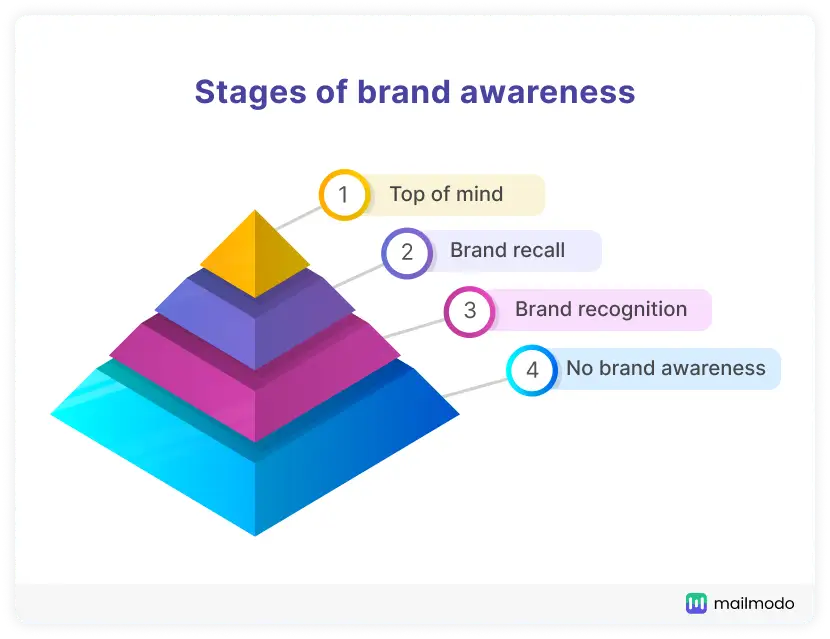
What are the benefits of brand awareness?
Brand awareness helps in more ways than just making people remember your brand. Here are some of the benefits of brand awareness:
Gain the audience’s trust
People are more likely to trust and buy from known brands than unknown ones. Brand awareness helps people know your brand, what you do, and your reputation. And when people can see who you are, they are likely to trust your brand.
That's why influencer marketing has become so successful in increasing brand awareness and trust. People hear about your brand through a person they trust or admire, so they trust your brand.
Build brand loyalty
Adding to the previous point, when people start to trust your brand and buy from you, it also stimulates brand loyalty. They know you, they trust you, they buy from you, they like you and keep buying from you in the future.
Related guide: How to Build, Measure and Improve Brand Image in 2022
Makes marketing easy
Based on the previous two benefits, people can buy from the brand because they know them and trust them. It means that companies don't have to actively market to them to get them to buy from the brand. It happens even without marketing.
Brand association
Brand awareness helps your brand be the thing people connect with for a particular need or purpose. For example, when someone wants to find some information online, they immediately search on Google. It means that brand awareness can help your target audience remember you when they have a need you offer.
Increases brand value
Last but not the least, brand awareness helps you increase your brand value. Brand value is your brand's worth, which depends on how your customer perceives your brand and their experience with the brand. And if people have a positive perception and experience, it increases the brand value. Similarly, negative perception decreases the brand value.
Ok, that's all well and good. But how does it affect the brand? The thing is that when brands have higher brand value, it simultaneously increases their stock prices, social impact, and ability to expand. And vice versa for negative brand value.
How to increase brand awareness?
After reading the benefits, you are excited and want to increase your brand awareness. Here are the strategies you can use to increase your brand awareness.
1. Create thought leadership content
You can create content in blog posts, guest posts, social media, email newsletters, YouTube videos, podcast episodes, etc. The format depends on what your brand does and what type of content your target audience consumes.
When you create content focused on your niche or topic, it shows people and search engines like Google that you are a thought leader. So, they'll start to trust what you have to say and share it with people who might find your content useful, thus improving your organic reach.
More reach will inevitably lead to increased brand awareness and demand generation for your product or service.
Related guide: How to Create Successful Demand Generation Strategies for Your Brand
If constantly creating content and putting it out there seems like a chore, well, because it is. But there is a way to make one content channel easier for you through email automation.
And you can't automate the content in the emails. But you can create an automated journey and change out what email you want to send to your audience. This way, you only have to create the content and not create a whole journey from scratch every time.
We have recently updated our email journey builder to help make journey creation easier for people; you can check it out by signing up. But if you want further assistance, you can book a demo to find out exactly how the new journey builder works and how you can optimize it to its full potential.
2. Advertise everywhere
According to a study, it takes about 5-7 impressions for people to remember a brand. So, you have to be seen multiple times at multiple locations for people to recognize your brand.
The channel you advertise on depends on where your target audience is the most active, what they like to consume, etc. It can be Google search ads, banner ads, TV ads, YouTube ads, Facebook ads, PPC ads, retargeting ads, social media advertising, etc.
3. Use co-marketing
You can partner with your niche or product brands but not competitors. This will create awareness amongst your audiences and get some benefits to your existing audience like discounts, free trials, etc.
Here's how Mailmodo partnered with Volopay and how it helped our audience.
We’re excited to announce our partnership with @volopay, a unified platform designed to streamline workflows and simplify spending.
— Mailmodo (@mailmodo) April 29, 2022
Currently, Volopay is offering its service at special offers to all the @mailmodo subscribers.
Explore the offer here - https://t.co/rwUP7i60Fs pic.twitter.com/ZOZwhWo1gE
4. Rebranding
Sometimes your brand might be really old, so all the brand elements like the logo, typography, colors, etc., might be a bit outdated. Or, you might have created your branding elements as a small business owner.
This is why it will greatly benefit your brand to have a fresh makeover. Hire a designer to create a better, more iconic logo or brand color palette.
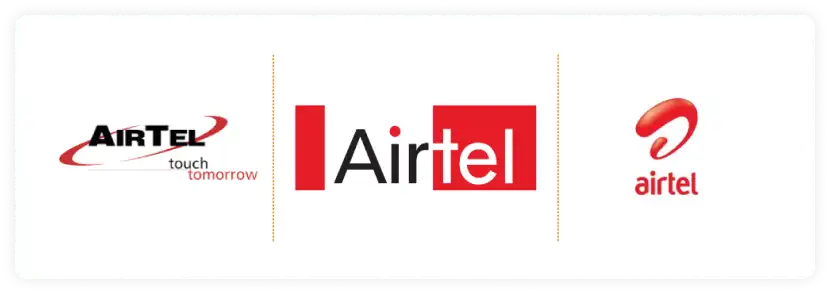
This is what Airtel's revamped logo was able to do for the brand.
Airtel not only rebranded itself in terms of a new logo, but the business also relaunched with new positioning, voice, strategy, etc. It helped them become a well-known telecommunications service company and increase their brand awareness.
5. Use a mascot
Now, a mascot can be an actual human face of the brand or a fictitious character. And we do know that it's not suitable for everyone, so only try this out if it's suitable for your brand and if you have the budget for it.
This strategy works because our brains can remember people, characters, or animals better than a logo. That's just human nature, so let's leverage that.
Here are some examples of brands that use mascots to get better brand awareness:
- Coco Pops
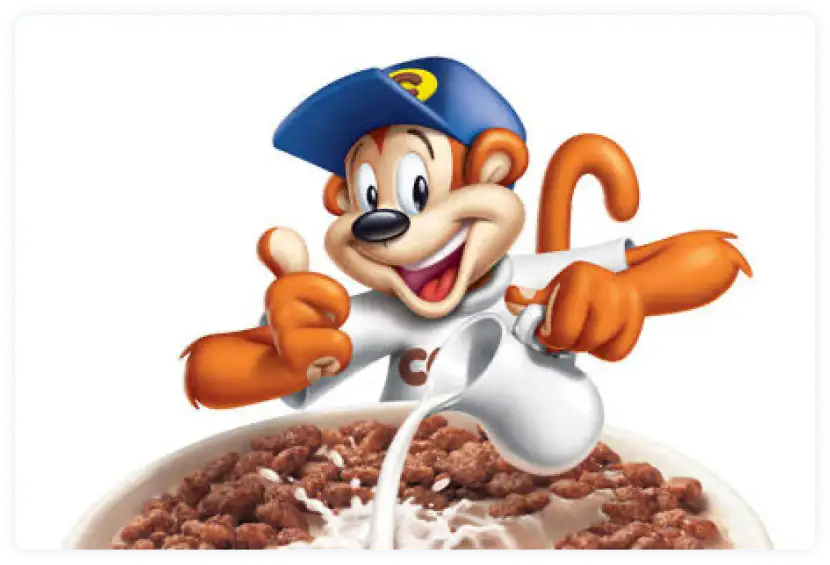
Source: Campaign
- Pillsbury

Source: Mondoweiss
- Duolingo
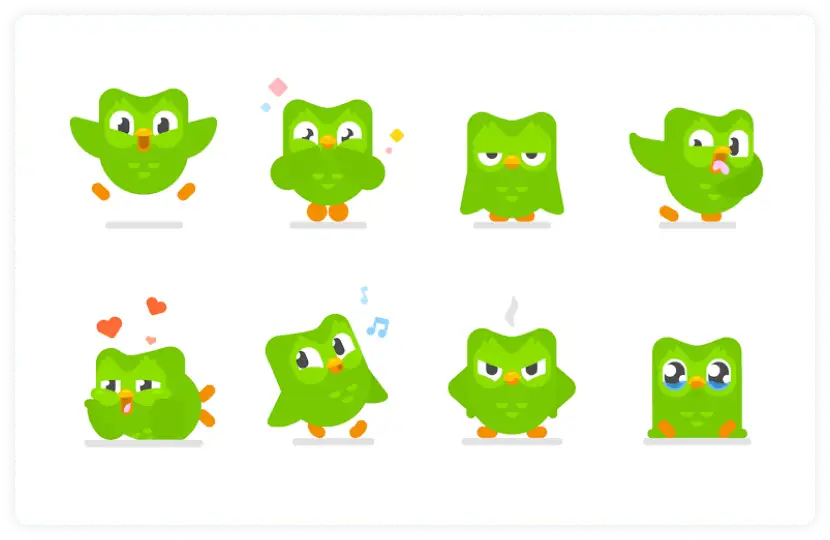
Source: TechCrunch
When you look at the mascots, you can immediately remember the brands, what they do, and even a certain memory associated with the brand or product. That's how powerful mascots are for brand awareness.
6. Offer free trials
This is a great strategy for most service-based brands, especially if your service plans are expensive. Most people are hesitant to buy something expensive if they are unsure if it's worth the investment. So, by giving them a free trial, you allow them to check out your brand and product first. This helps build trust and increase awareness as they'll recommend it to other people if they feel pleased with the free trial.
7. Sponsor events
This is a good option for bigger brands with a high budget. You can sponsor an event, games, award shows, etc. Your logo will be placed at several locations at the event and during the event's promotion. When people see your brand at such places, it passively gets registered in their brains. And they will be able to remember your brand when they come across it again.
8. Use word of mouth marketing
Word-of-mouth marketing is one of the most powerful strategies for brand awareness because even if you don't reach a huge audience, you can gain the trust of the small audience you reach. This is because people trust the words and opinions of other people more than any ad. So any word-of-mouth strategy like a referral, influencer marketing, etc., will effectively increase brand awareness and build trust.
Related guide: How to Build a Successful Word of Mouth Marketing Strategy
9. Offer freebies
One of the classic ways to increase brand awareness is by providing free stuff. People take it and remember who provided it and what they do. Now, what type of freebie is up to you. It can be frivolous stuff like keychains, posters, baseball hats, etc., just to put your branding out there. Or meaningful stuff like eBooks, reports, whitepapers, etc., that provide value to your audience.
At Mailmodo, we generated awareness for our brand by creating freebies like our Email QA checklist and State of Email eBook to help people with email marketing and establish ourselves as thought leaders in the field.
Another thing you can do under this category is host contests and giveaways on social media, as those posts usually tend to go viral. So, you can reach a bigger audience organically and increase awareness.
Now, let me clarify that these are not the only ways to create brand awareness; there are more. So, read more articles and try different ideas to increase your brand awareness.
How to measure brand awareness
You can't measure brand awareness in traditional means where you get solid numbers. But you can measure activities and metrics to gauge if it's going in the right direction. Here are some ways you can measure:
Website analytics
The number of direct traffic you have gotten can be a great way to determine how many people have visited your website directly by entering the URL themselves. This shows how many people remember you and have actively searched your website.
You can use tools like Ahrefs to analyze the search volume for your branded keyword. This shows how many people are searching for the name of your brand. And you can keep monitoring it over a period to see how much your brand awareness increases.
Social media reach and engagement
If you are putting out content on social media or any other platform, here are the things you can track to measure your brand awareness.
Impressions
Reach
Sessions
Likes
Follows
Shares
Comments
Saves
Clicks
These metrics will show how many people you can reach, how much they like it, etc. All these will ultimately show you how well known your brand is becoming.
Social listening
Social listening is when you look at how people talk about your brand online, including reviews, comments, mentions, hashtags, etc. It'll show you how people truly feel about your brand. You can use tools online like Brand24 to keep tabs on social media, news, websites, publications, etc., to find out who is talking about you.
Ask people how they came to know about you
You can ask people how they came to know about you when they first joined or became a customer. Or you can also survey through social media, email, or telephone and ask people (existing customers or random people) how they came to know about your brand.
And when conducting surveys through emails, you will usually have to direct them to a different website which can cause friction and lead to people not filling out the survey.
We can help you with that. With Mailmodo, you can send surveys that people can fill within the email itself.
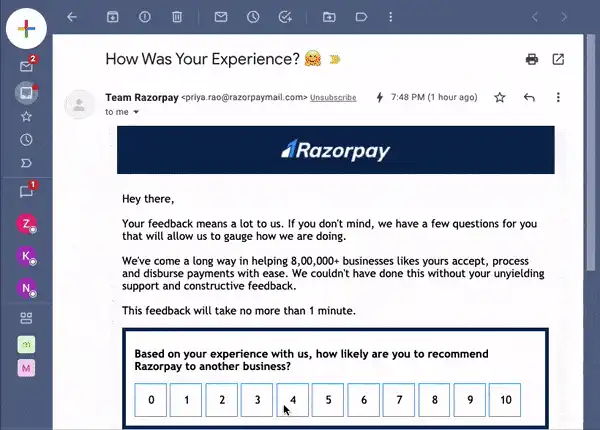
Check out our Interactive feedback form templates
This reduces friction, so you'll get more people to answer your survey. And, if you want some guidance on how to create it, book a demo, and we'll show you how it works.
Related guide: Conducting Surveys With Interactive AMP Emails
Make people aware
Hopefully, you understand how crucial it is to increase your brand awareness before focusing on getting sales. Get going and work on increasing awareness with the strategies mentioned above.
After creating some awareness, it's time to move to the next level, attracting leads. Check out our guide on top of the funnel to know more about how you can attract leads with top-of-the-funnel content.
What you should do next
Hey there, thanks for reading till the end. Here are 3 ways we can help you grow your business:
Talk to an email expert. Need someone to take your email marketing to the next level? Mailmodo’s experts are here for you. Schedule a 30-minute email consultation. Don’t worry, it’s on the house. Book a meet here.
Send emails that bring higher conversions. Mailmodo is an ESP that helps you to create and send app-like interactive emails with forms, carts, calendars, games, and other widgets for higher conversions. Get started for free.
Get smarter with our email resources. Explore all our knowledge base here and learn about email marketing, marketing strategies, best practices, growth hacks, case studies, templates, and more. Access guides here.


